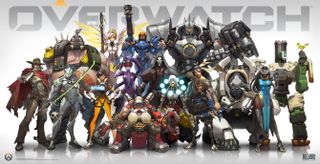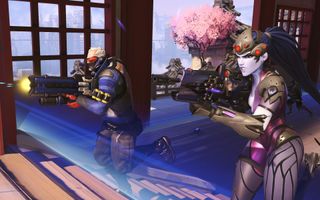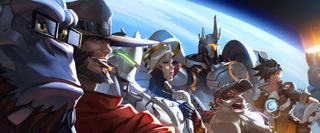
A few days ago, Blizzard announced the newest character coming to Overwatch, Soldier: 76. His backstory was told through an origin story video and a 1,600-word blog post; the disgraced leader of the Overwatch organization, Jack Morrison, who was now thought to be dead. He was once looked at as the savior of the world, but is now no more than a vigilante—focused on “the mission” and nothing else. They described a compelling and nuanced character, so when video of a full match from Soldier: 76’s perspective was released yesterday, it was weird to me that, in-game, all this backstory manifested itself as some generic guy with a machine gun.
To be fair, Principal Designer Geoff Goodman tells me it was “an explicit design goal to make sure he’d be accessible to newer players,” but this isn’t the first time I’ve expressed a similar concern with Overwatch as a whole; I mentioned it in my low of the week back in May when I discussed how the game’s support characters seemed to have bland abilities despite their vibrant personalities, and it's a trend I am noticing as we see more and more in-game footage. A character’s backstory will be funnelled into their off-hand comments and one-liners during a match, but their abilities don't seem to reflect the detail they each have. In comparison to its interesting and unique world, Overwatch’s actual gameplay—which Evan seemed pretty optimistic about back at PAX East—seems to me like the least interesting thing about it.
After Soldier: 76’s announcement, I went back and watched the Overwatch cinematic reveal trailer from Blizzcon this past November. When it was first shown, nobody knew what they were watching. It felt like a Pixar movie, and quickly made us connect with the characters in a similar fashion. Rewatching it for the first time nearly eight months later gave me goosebumps as I started to recognize more and more small details from things we’ve learned since Blizzcon. The young kid wearing a t-shirt with Reinhardt’s helmet on it, McCree standing in the lineups even though he wasn’t formally announced until March, and even multiple shots of Jack Morrison—images we wouldn’t see again until his announcement earlier this week.
I’m calling out these specific details because in the time since this trailer, Blizzard has continued to make me care about Overwatch’s world and the characters in it. These are people (and apes and robots) I like and want to learn more about, but I am nervous that a 6v6 first-person shooter won’t be a good environment to do that. Competitive shooters, by their very nature, are an exercise in repetition. The map and objectives may change, but what you are doing and the world you do it in is always the same. This isn’t inherently a bad thing and, depending on the game, can be an endlessly replayable amount of fun. But it could also undermine the story of a world Blizzard has clearly put a lot of effort into building, as it is restricts the effect story can have on gameplay.

Team Fortress 2 has done a fantastic job at creating short, story-filled movies for its characters, but they rarely have an impact on your average match. In TF2’s case, that’s completely OK, because the characters weren’t initially created to have depth and nuance. They started out as stereotypical archetypes, and were given personalities and relationships later on—and the evolution of those characters, the narrative explanations for new mechanics and modes, softened the massive changes that TF2’s almost 500 updates have brought. It’s easy to forgive the lack of overall story significance in a TF2 match because we were introduced to the gameplay first and the characters second. Overwatch was introduced to us with a movie, its characters are steeped in plot and backstory, and seeing three Tracers shooting at two enemy Winstons may obscure that world.
None of these complaints are to say that Overwatch’s gameplay looks bad.
None of these complaints are to say that Overwatch’s gameplay looks bad, in fact it looks really good. The combat seems satisfying and fun, and the animations for each character are gorgeous. Those who have already played it here at PC Gamer can confirm that it’s a good time. This is more an expression of my disappointment that Blizzard created this enthralling world full of characters and then dropped them into an objective-based FPS, where I’m worried they’ll become no more than props.

The reveal trailer made me pine for as much of this universe as they could show me. I want to watch a feature length Overwatch movie. I want to read Overwatch comics. I want to play a 10-hour single-player/co-op Overwatch campaign and watch as the world changes and the plot progresses. Possibly the last thing I want from Overwatch is a competitive shooter—where every round takes place in the same moment of time, where a character’s allies, enemies, and death are meaningless, and where nothing changes in the world. It’s a testament to how good Blizzard is at storytelling that they’ve got me more invested in the story than the game.
The biggest gaming news, reviews and hardware deals
Keep up to date with the most important stories and the best deals, as picked by the PC Gamer team.
An Overwatch graphic novel was actually just announced yesterday at San Diego Comic Con, but we also already know that there won’t be a single-player or campaign mode, only multiplayer. Blizzard has assured us that they want to keep the Overwatch world spinning, and Senior Designer Michael Chu told me they’ll “continue to delve deeper into the world as time goes on, and the story will keep unfolding and moving forward.” Until we find out what they’ve got planned, I’m going to try and stay hopeful that the lore will be reflected in-game—at least in a more significant manner than just hearing Soldier: 76 grumble “the mission is all that matters,” as he shoots an enemy version of himself. Overwatch has one of the most exciting new game universes I’ve seen in a while, and I want Blizzard to keep telling me more about it.
Most Popular

